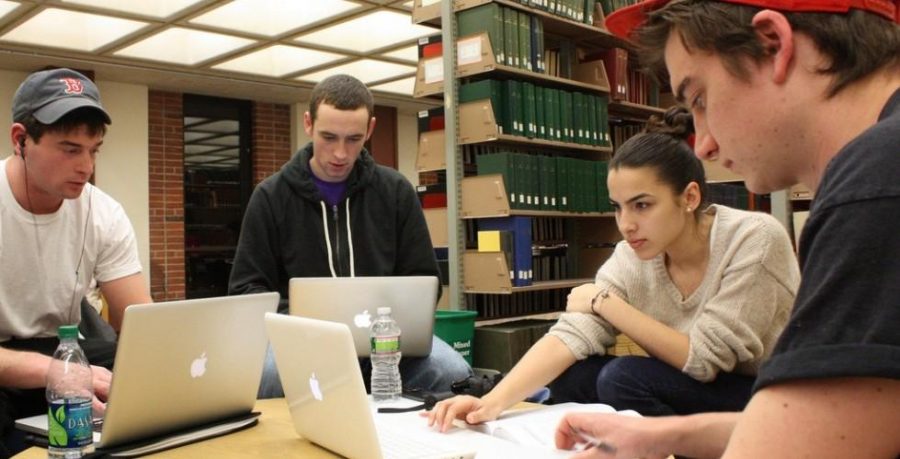When students have the misfortune of catching an illness such as the flu or pneumonia, they are advised both by doctors and the university to stay home and rest up. What happens, though, on days where getting up feels like a chore you are physically incapable of doing and emotional exhaustion is draining you of all energy to work, study or socialize?
For college students that experience this, they are left with two choices: drag themselves through the day at the risk of further emotional deterioration, or give their brains a breather at the expense of their grades.
Last year, the American College Health Association reported that 87.4 percent of college students felt overwhelmed by everything they had to do, 84.7 percent felt exhausted (not from physical activity), and 45.1 percent felt so depressed that it was difficult to function.
Other issues experienced by students include, but are not limited to, generalized anxiety disorder, social anxiety disorder, bipolar disorder, attention-deficit/hyperactivity disorder and more.
As the mental health epidemic continues to grow, it is pivotal that professors learn to treat students as human beings and not just experimental units of one’s academic limits. Mentally ill students should not have to face the roadblock of being punished by apathetic and uninformed teachers who believe that the path to success is linear.
“Institutional leaders, frontline advisers and faculty members have been led to believe that if college students do well academically…then they will also be happy, healthy and flourishing in higher education and life,” writes author Henry G. Brzycki. “That is a false belief that we should not perpetuate.”
While teachers are not therapists or are required to be experts in mental health, they should be encouraged to present themselves as allies for college students with mental health concerns. Though some professors may feel uncomfortable speaking on such serious matters, most students would feel grateful and much more comfortable in having a mental health advocate teaching their class. They would know that they are being heard, supported and understood.
During the first week of class, I was surprised hearing several of my professors respectfully note their awareness surrounding the prevalent issues that often overtake college students at unpredictable times over the course of the semester. They explained their understanding that life happens sometimes, and that it is okay to be absent when we are not well, so long as we talk to them about it. This was shocking to hear when in past semesters all I had ever been told was that “excused absences are permitted solely under extreme circumstances.”
This gesture alone made me, and likely many others, feel at ease, which is why University of Michigan graduate student research assistant Sara Abelson suggests that professors include a syllabus statement on mental health and point it out at the beginning of the semester. “Doing so helps to set expectations, normalizes the need to seek help, and emphasizes the link between mental health and academic success,” says Abelson.
For students with anxiety, participating can feel impossible. When participation is worth nearly half the overall grade, the grades of those with an inability to speak publicly can seriously suffer. In this situation, students and professors should come together and try to find an alternative to participating; a different way to demonstrate one’s knowledge of the material, such as reports, papers or projects.
Abelson also believes that deadlines should be sometime in the middle of the day instead of midnight or 9 a.m. Students won’t have to stress staying up late or waking up early just to complete an assignment. This can, in turn, subtly reinforce better sleeping habits and push students to manage their time better or do assignments in advance.
Henry Brzycki, founder of The Brzycki Group, recommends an approach he once used when he was a dean and professor called “Self Across the Curriculum,” an program that allows students to better understand their purpose in life and in turn intrinsically motivate them to use the skills they possess to deal with real problems. Encouraging the discussion of students’ dreams helped them feel more inspired to persist with their studies. Notable success was found in this program, as student satisfaction scores went up by almost 40 percent.
Posting all lectures and notes online is another small action that can make it easier for students who miss class periodically to catch up on the material.
“Our mental health helps lay the groundwork for how we live in this world,” says psychotherapist Cori Dixon-Fyle, LCSW. Success does not equal being over-productive and pushing one’s limits to the point of exhaustion.
At the end of the day, a student should never feel like there isn’t room on their schedules to prioritize their own mental health. That’s why it’s important to work with students, learn their needs and be unafraid to talk about the epidemic that has challenged the lives and goals of so many.
Gabby Campos is a Collegian Columnist and can be reached at [email protected].




















Ed Cutting, EdD • Feb 19, 2020 at 3:33 pm
A doctor I know — an eye surgeon — makes an interesting point. While mental illness involves individuals and individual conditions, collectively it can be largely a factor of environmental conditions.
.
In other words, when a school (e.g. UMass) has a large number of students with mental illness, one needs to consider the possibility that the school itself may partially be the cause.
.
UMass needs to look at itself and not at its students…
Henry Brzycki • Feb 13, 2020 at 2:03 pm
Well done Ms. Campos! Thank you for mentioning my work.